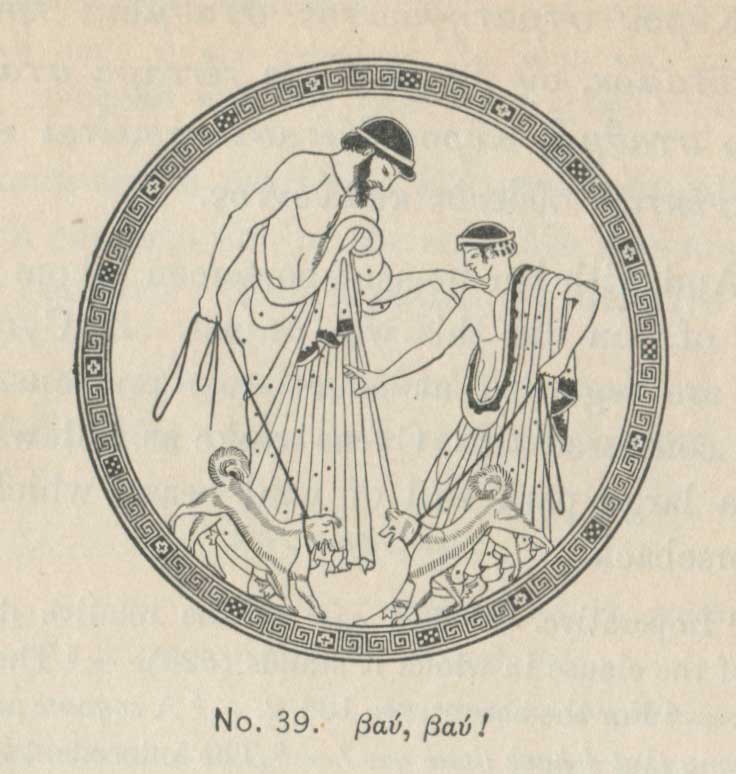THE FIRST GREEK BOOK
BY JOHN WILLIAMS WHITE, PH.D, LL.D., LITT.D.
Professor Of Ancient Greek At Harvard University
This Revision Copyright ©2012 by Shawn Irwin
Lesson LVI - Relative Pronouns. Genitive Absolute. Numerals
S512. The relative pronouns are ὅς, ἥ, ὅ, who, which, and
ὅστις, ἥτις, ὅ τί, whoever, whichever. The latter is called the indefinite relative.
S513. Learn the declension of ὅς and ὅστις in 764.
S514. ὅστις is compounded of the simple relative ὅς, and the
indefinite enclitic τὶς, (354), each part being separately declined, ὅ τί
is so written to distinguish it from ὅτι, that, because.
S515.
1. ταῦτ᾽ ἐπράχθη Κλεάρχου στρατηγοῦντος.
This was done when Clearchus was general.
2. μετὰ ταῦτα Κύρου κελεύοντος Ὀροντᾱν απάγουσιν.
After this, at the command of Cyrus, they lead Orontas away.
These participles are circumstantial (495), and express time and cause; each modifies a noun in the genitive;
the noun and participle are not grammatically connected with the main construction of the sentence.
S516. A noun and a participle not grammatically connected with the main construction of the sentence may
stand by themselves in the genitive. This is called the Genitive Absolute.
S517. Learn the first ten cardinal numerals in 756, and the declension of
εἶς, δύο, τρεῖς, and τέτταρες, in 757.
S518. VOCABULARY.
εἶς, μιά, ἕν, one.
ἐξελαύνω, drive out; intrans., march, march on.
Ζεύς, Διός, ὁ, Zeus, highest of the gods.
καταπράττω, do thoroughly, accomplish.
ὅς, ἥ, ὅ, relative pronoun, who, which.
ὅστίς, ἥτις, ὅ τί (ὅς + τὶς), relative pronoun, whoever, whichever.
οὑδείς, ουδεμία, οὐδέν, declined like εἶς. (οὐδέ + εἶς), none, no, nobody, nothing.
στάδιον, ου, τό, stadium, stade, 600 Greek feet.
στρατηγέω, στρατηγήσω, ἐστρατήγησα, ἐστροτήγηκα, (compare σρατηγός),
be general, lead, take command.
σωτήρ, ῆρος, ὁ, (compare σῴζω), preserver, savior, a title given to Zeus.
τέτταρες, α, four.
τρεῖς, τρία, three.
τρίτος, η, ον, (compare τρεῖς), third. τὸ τρίτον,
as adv., the third time.
S519.
1. ἡγεμόνα αἰτεῖτε ὅστις ὑμᾶς ἀπάξει.
Imperative. ὅστις The case of the relative depends on the construction of the clause in which it stands (826).
2. ἐξελαύνει διὰ Φρυγίᾱς σταθμὸν ἕνα εἰς πόλιν οἰκουμένην, εὐδαίμονα καὶ μεγάλην.
3. ἦσαν δὲ αὐτοῖς βόες οὓς ἔθῡσαν τῷ Διὶ τῷ σωτῆρι.
4. ἐὰν καλῶς καταπράξω ἐφ᾽ ἃ στρατεύμαι, κατάξω ὑμᾶς οἴκαδε.
The antecedent is omitted (827).
5. μετὰ ταῦτα, ὦ Ὀρόντα, ἔστιν ὅ τι σε ἠδίκησα;
For the accent; see 166, 2.
A cognate accusative (833), is there any wrong that I have done you?
6. Κύρου δὲ κελεύσαντος ἀρίστιππος ἀπέπεμψεν ὃ εἶχε στράτευμα.
The antecedent is attracted into the relative clause (829), for ἀπέπεμψε τὸ στράτευμα ὃ εἶχε.
7. ἐντεῦθεν ἐλαύνουσι Κύρου στρατηγοῦντος σταθμοὺς τρεῖς ἐπὶ τὸν εὐφράτην ποταμόν, οὗ ἦν τὸ εὖρος τέτταρα στάδια.
8. ἐν δὲ τῷ τρίτῳ σταθμῷ Κῦρος ἐξέτασιν ποιεῖται ἐν τῷ πεδίῳ περὶ μέσας νύκτας, οὐδενὸς κωλύοντος.
S520.
1. And with her he sent horsemen whom Menon had.
2. Whoever of you did this was unjust.
3. Cyrus sent him gifts which are regarded at court (as) precious.
παπὰ βασιλεῖ.
4. When Orontas had confessed this, Cyrus spoke as follows.
5. There Cyrus had a large park full of wild beasts which he used to hunt on horseback.
Imperfect.
S521. Orontas confesses his Treachery.
"Τί οὖν, ἔφη ὁ Κῦρος, ἀδικηθεὶς ὑπʼ ἐμοῦ νῦν τὸ τρίτον ἐπιβουλεύεις
μοι;" λέξαντος δὲ τοῦ Ὀρόντᾱ ὅτι οὐδὲν ἀδικηθείς ἐπιβουλεύει, ἠρώτησεν
ὁ Κῦρος αυτόν, "Ὁμολογεῖς οὖν περὶ ἐμὲ ἀδικῆσαι;" "Ὁμολογῶ," ἔφη
ὁ Ὀρόντᾱς, " ἀνάγκη γὰρ." ἐκ τούτου πάλιν ἠρώτησεν ὁ Κῦρος, Ἔτι οὖν
ἂν εἴης τῷ εμῷ αδειλφῷ πολέμιος, ἐμοὶ δὲ φίλος καὶ πιστός;" ὁ δὲ
ἀποκρίνεται, "Οὐδ᾽ εἰ εἴην, ὦ Κῦρε, σοί γʼ ἂν
ποτε ἔτι δόξαιμι.
Here causal (495, 2), because you have suffered what wrong? but in line 3 concessive (495), although
he had suffered no wrong.
Infinitive in indirect discourse (469).
σοι-γέ: to you at any rate.
ποτε ἔτι: ever again.
δόξαιμ: scilicet, φίλος καὶ πιστὸς εἶναι.

See the route on the map.
End Of Chapter
INDEX
Chapter 57
HOME
This Revision Copyright ©2012 by Shawn Irwin
